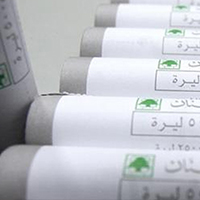 Lebanese Republic
Lebanese Republic Previous Projects
E-Commerce

As early as 2002, the Ministry of Economy and Trade recognized the importance of e-commerce as yet another tool that can
help position Lebanese firms to take advantage of the global market. The growth of the e-business sector of the global economy
has been impressive. The Ecomleb project was then conceived and designed in order to address the main stoppers of e-commerce
in Lebanon. Funding was secured through a € 1.7 Million grant from the European Commission.
The EU funded Ecomleb project (January 2004 – July 2005) has two main objectives:
1- The development of the complete legal framework for e-commerce
2- Business development and awareness campaigns
The Legal and Regulatory Framework for e-Commerce
The legal component of the Ecomleb project includes the drafting of a comprehensive regulatory framework including
all aspects of Internet interaction and trading. Overall, 200 articles (Fr) are being proposed under nine titles.
The first three titles are additions to the existing Lebanese legislation. They are autonomous and constitute the new
Lebanese Internet code.
The three titles address:
The other six titles contain half of the articles and integrate directly into the existing Lebanese codes, to address
the problems of electronic writings and using electronic means for communications and commercial exchanges.
The areas being addressed are the:
6. Finally, a title related to Domain Names Allocation will be integrated in the draft law on industrial property. (Ar / Fr)
The legal framework proposed is based on the following principles:
1- Liberty of carrying out electronic communication and writings
2- Security issues for all electronic communication and writings
3- Coherence with the EU legal system
4- Compatibility with the Lebanese existing laws
Professor Pierre Catala, a prominent European legal expert, with publications on the legal aspects of the digital economy and specific knowledge of the Lebanese legal system, headed a team of lawyers for the drafting of the projects of law. The legal team also comprised Valerie Sedallian, attorney at law in the Paris Bar, and author of “Droit de l`Internet”, one of the first books on the legal aspects of the Internet in 1997. On the Lebanese side, Rania Haj Chahine, Tamam Hreich, Joelle Richa, and Linda Qassem worked with the French experts to develop the draft laws. Last but not least, the legal team worked in close cooperation with key stakeholders including Minister Bahij Tabbarah, Dr. Toni Issa, the Central Bank, the General Security Forces, prominent judges and with prominent lawyers including Professor Fayez Haj Chahine, Ibrahim Najjar, and Mohammad Alem.
Business Aspect of e-commerce
As part of its activities, the Ecomleb project conducted a survey to identify the main stoppers of e-commerce in Lebanon.
The survey identified 75 businesses involved in B2C e-commerce; 56 of those responded to the survey.
The main stoppers of e-commerce in Lebanon are:
1- The high cost of Internet and the telecommunications infrastructure
2- The unavailability of fast internet connections (broadband)
3- The lack of confidence of the consumer in Internet transactions
4- The lack of a regulatory framework
5- The high cost of shipping packages
The Ecomleb project was able to address two out of the five stoppers. The legal framework including consumer protection was
formulated under the legal component of the project, and the perceived lack of confidence was addressed in the awareness campaign.
As it turns out, the business bears the cost of the fraudulent transactions
(people using stolen credit cards) and not the consumer. There is no evidence of credit card theft during the on-line transaction.
One of the main findings of the survey is that e-commerces that position themselves for the global market in general,
and the Lebanese Diaspora in particular are the ones that are thriving. The Lebanese Diaspora are the people of Lebanese
origins living all over the world.
Their number is estimated at 12 millions. These have the available income, the high speed connections,
and the on-line buying culture that allows them to be valuable and reliable customers.
The Lebanese market is small and its size is one of the reasons that explain the high cost of services related to e-commerce.
The price of these services (including starting up a new company, hosting, and on-line payment gateways)
remain higher than the international norms. The technology is there. Making it available at competitive prices remains the challenge at hand.
Awareness Campaign
The Ecomleb project assessed that the Lebanese public lacks information in general about the Internet and Information Technologies.
It then conceived and published four issues of the “Ecomleb Internet and IT Journal”. The journal was distributed for free and reached
25,000 copies for certain issues.
The feedback for the journal was overwhelmingly positive. Many readers called to report that the journal provided them useful information in
1- IT and e-commerce in Lebanon (e-commerce case studies, IT related policies, comparative study on e-banking, etc.)
2- IT and e-commerce around the world (e-commerce and country case studies)
3- Technical tips (how the Internet works, Internet security tips, etc.)
Ecomleb has also developed an informational portal www.ecomleb.org and a series of CDs that include useful and practical information
as well as videos of real Lebanese e-commerces providing the ability for consumers to purchase goods and services on-line.
The CD is distributed nationally and internationally in order to serve as a common marketing tool for all Lebanese e-commerces
which could not have conducted the much needed marketing on their own.
Note : Some documents require Adobe PDF to Open , you can Click Here to download the software













